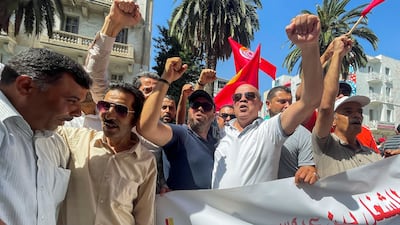The severe impact of the war in Ukraine on Tunisia's economy, coupled with its high debt and deteriorating finances, necessitate the implementation of needed reforms and the International Monetary Fund is ready to start negotiations on a funding programme for the North African country in the "coming weeks".
“The spillovers from the war in Ukraine are deepening Tunisia’s already high economic imbalances, while creating more hardship to the population," said Jihad Azour, the director of the Middle East and Central Asia Department at the IMF.
The IMF, which has held technical discussions for several months with the country, "stands by the side of the Tunisian authorities in their efforts to advance economic and social reforms for the benefit of the population”, Mr Azour said.
Mr Azour met with President Kais Saied to discuss the government’s economic reform programme, along with Najla Bouden, the head of the government, as well as representatives of the civil society, during his June 20–21 visit.
Tunisia seeks $4 billion in funding from the IMF, which could help it steer the nation out of its worst economic and financial crisis that has been exacerbated by the rise in energy and commodity prices globally and the effects of the Ukraine war that have widened its current account deficit.
Securing funding from the IMF requires unpopular decisions that include the freezing of wages, and cutting energy and food subsidies at a time when rising inflation has slashed spending power.
Rising consumer prices have fuelled public discontent across the country, resulting in mass protests and countrywide labour strikes.
Political turmoil in the country also impeded reform efforts. Ahead of a referendum on constitutional reforms, Mr Saied dissolved parliament and took control of the country’s judiciary after firing 57 judges. In July, Mr Saied suspended parliament and dismissed the prime minister.
That political instability and deteriorating economy led Fitch Ratings to cut Tunisia’s rating in March to “CCC”, from “B-", seven notches below investment grade and on par with El Salvador and Ethiopia.
The rating downgrade denotes a very high level of default risk relative to other issuers or obligations, mainly due to heightened fiscal and external liquidity threats.
“The severity of the economic situation makes the need for swift implementation of ambitious reforms evermore pressing," Mr Azour said.
“Tunisia needs to urgently tackle its fiscal imbalances, by improving tax equity, containing the large civil service wage bill, replacing generalised subsidies with transfers targeting the poor, strengthening its social safety net, and reforming its loss-making state-owned enterprises to quickly reduce its sizeable economic imbalances and ensure macroeconomic stability."
Earlier this month, Finance Minister Sihem Boughdiri said she expected to resume talks with the fund soon over the funding programme. In preparation, the government will begin to cut food and energy subsidies in 2023 and reduce the public wage bill by 5 per cent over the next three years.
Mr Azour said strengthening competition and opening up the economy to private sector investment would help "unleash Tunisia’s potential for inclusive and much-needed job-rich economic growth".
The IMF projects Tunisia's economy to grow 2.2 per cent this year and inflation to rise to 7.7 per cent. The World Bank estimates GDP growth of 3 per cent this year.
Tunisia’s government debt rose to 79.2 per cent of GDP in 2021, according to government estimates, lower than the 85.6 per cent initially projected in the 2021 budget.
“A home-grown reform program, as presented by the government, has the benefits of stronger ownership and greater credibility, and thus of a greater chance of success than in the past," Mr Azour said.
"Ownership over reforms matters a great deal, with or without an IMF-supported programme ... It is also very important to further articulate the specific policies and reforms and discuss them with all stakeholders so that they unite around the government programme and contribute to this effort."


